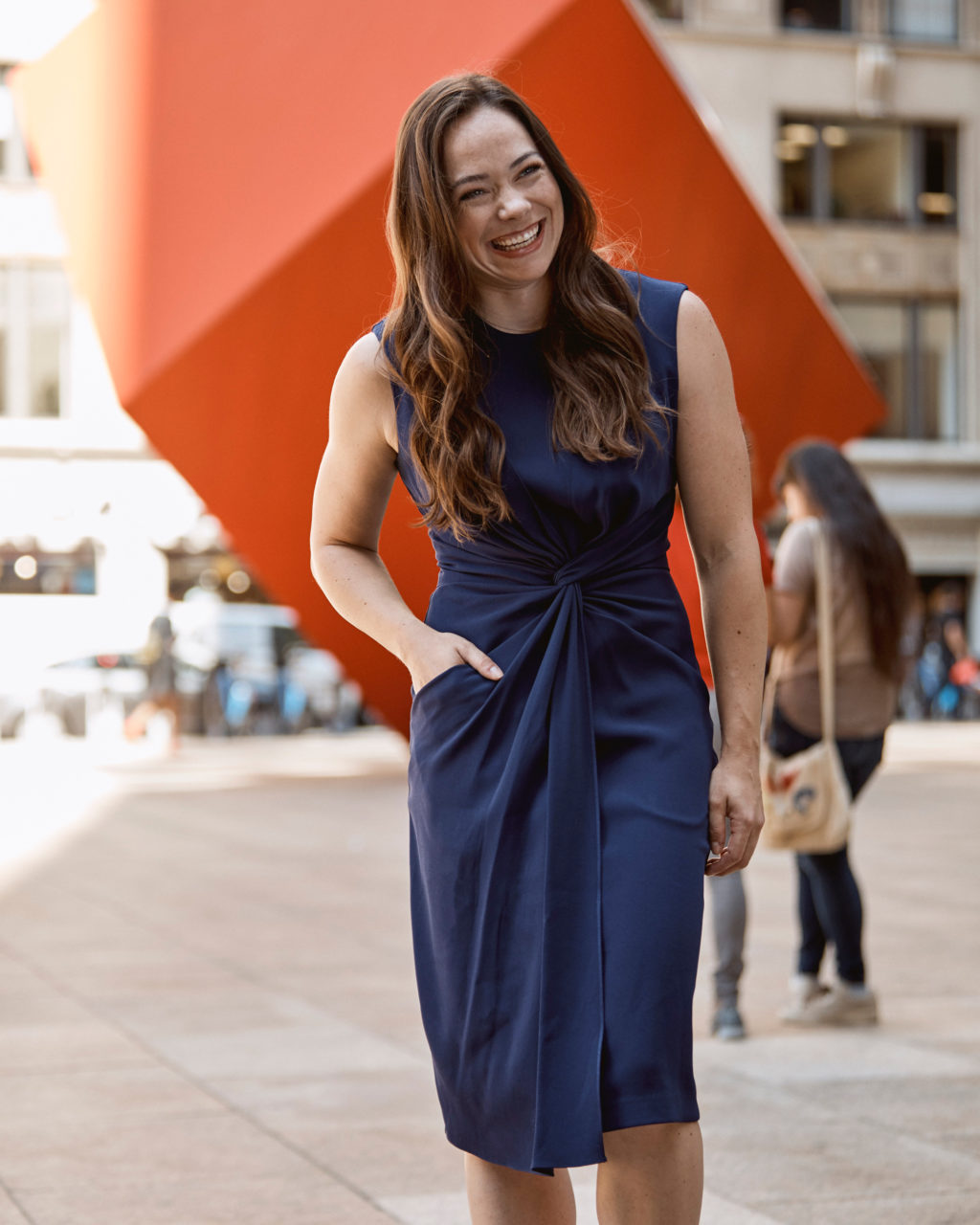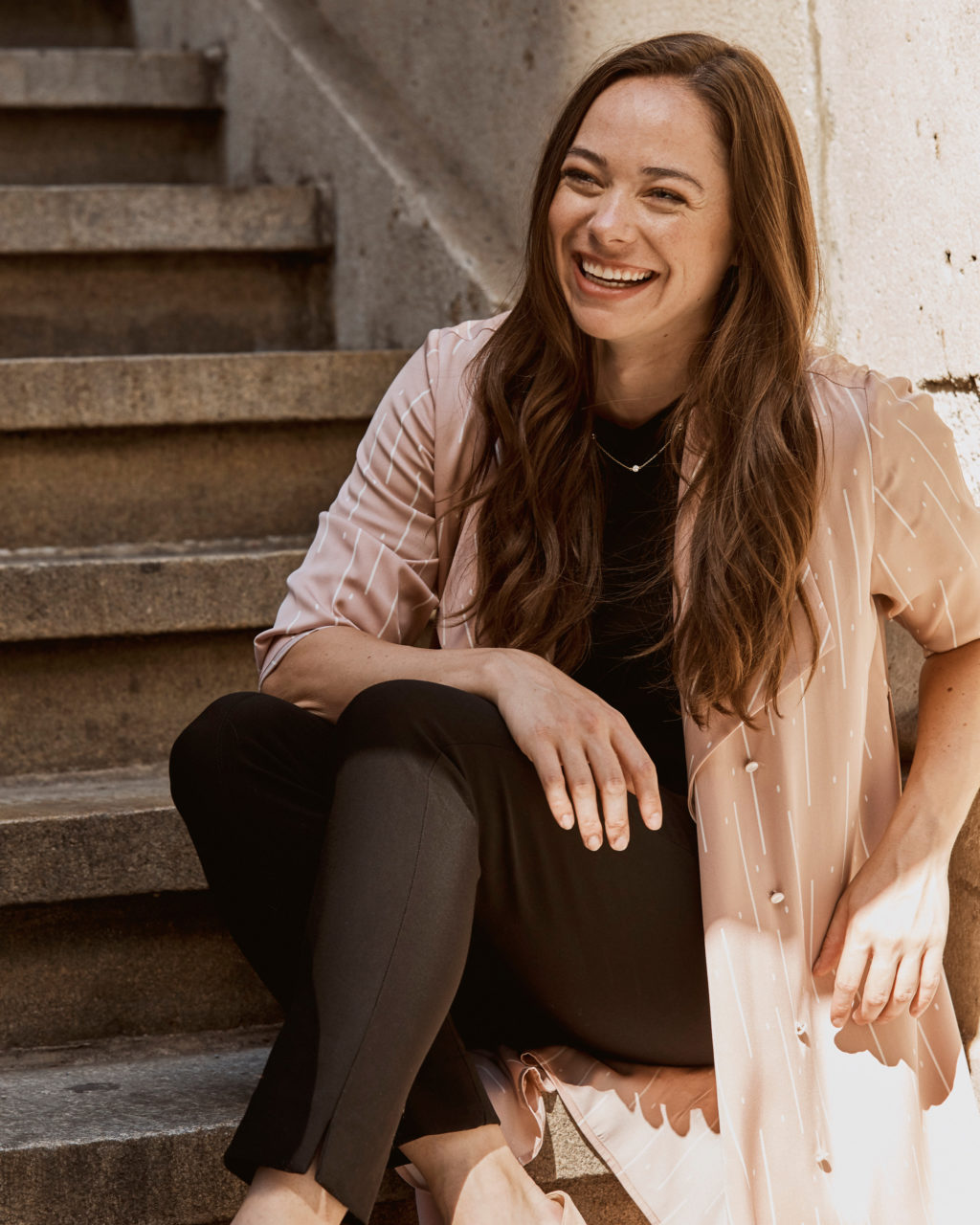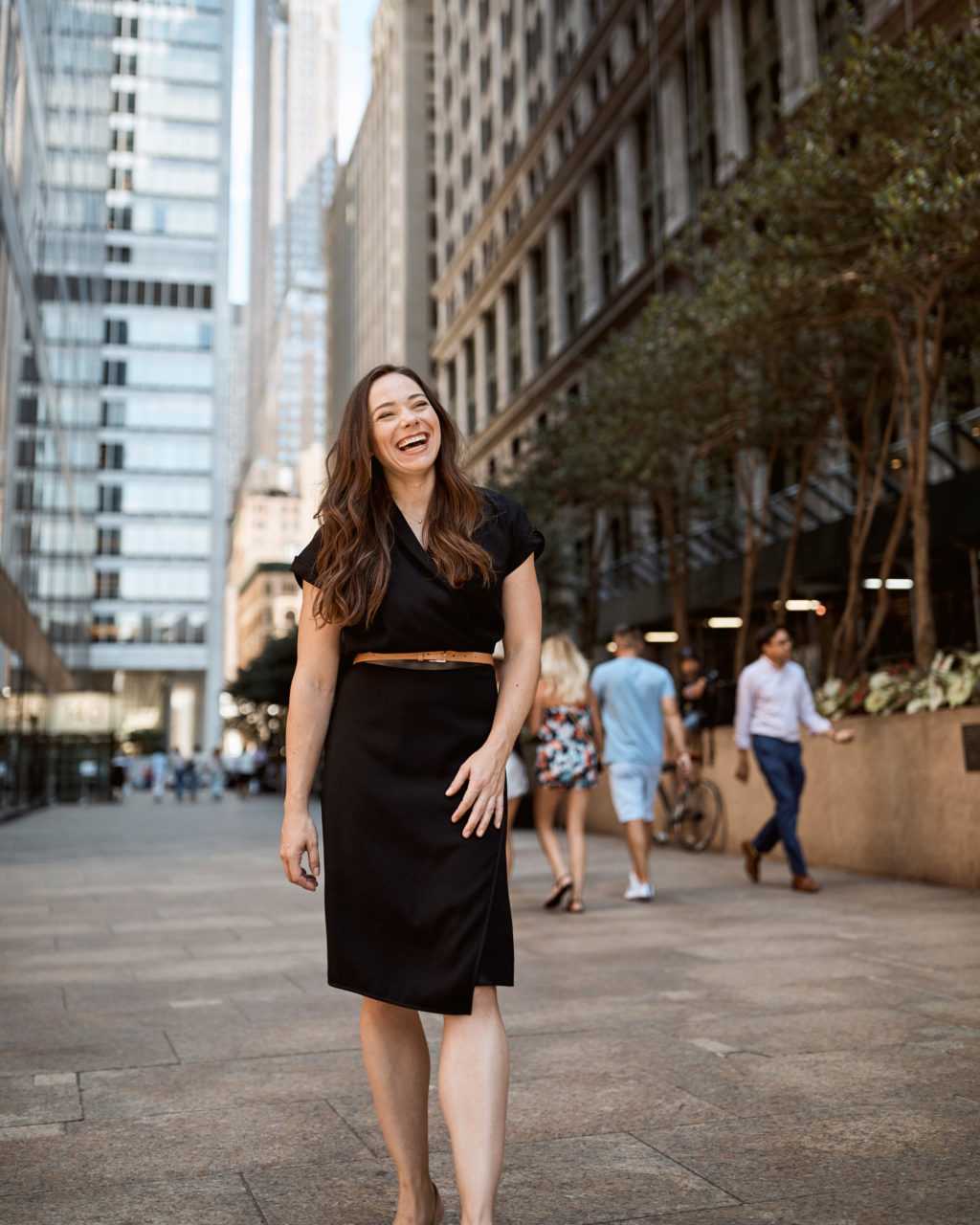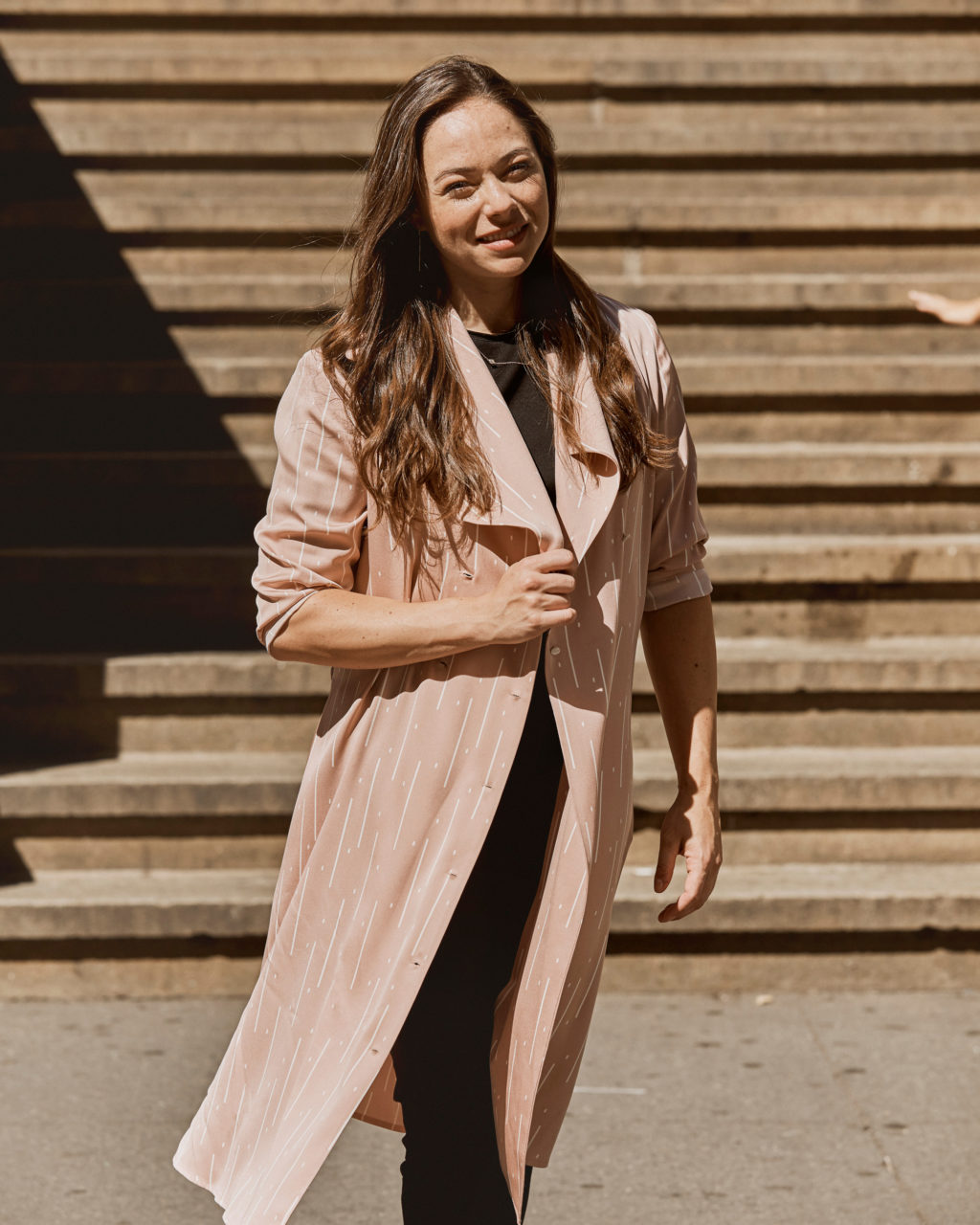How to Shake Off Failure, According to Entrepreneur Jacqueline Boltik
September 06, 2018 | Filed in: Woman of the Week
Jacqueline Boltik has had a busy year: She co-founded a new software company, Yellow Brim, and also helped pass a new law in Massachusetts, the BRAVE Act, which provides special legal provisions for veterans. “I think a lot about my ‘time pie,’” she says. “I’ve learned that I work best when I’m putting the majority of my time towards one goal—in this case, my company—while also having a second goal on the side.” Here, Boltik discusses her previous lives as a competitive ice skater, failed startup founder, and director of strategy and development at the L.A. Times, as well as her strategy for befriending people she admires.

Jacqueline wears the Taylor dress in deep indigo and the Phoebe earrings.
I’M ORIGINALLY FROM OHIO, and when I was growing up, I did competitive ice skating. I started at age eight, which is relatively late—my grandmother gave me lessons for my birthday. When I was 16, I moved to Boston to train. I lived with a family in Cambridge and some other skaters, all in the same house, and they became like a second family to me. We’re still very close.
I ALWAYS CARED ABOUT SCHOOL, but because I was so focused on skating, I had a modified class schedule where I would only show up for a couple of hours every day. Then, during my senior year, I got injured and needed surgery, and my skating career was over. Since I was living in Cambridge at the time, I went on a campus tour at Harvard, and I asked the guide, “How did you get in?” He said, “I applied.” It was one of those “Aha!” moments when you think, Oh, I can do that.
HAVING A STRICT SCHEDULE ever since I was young definitely taught me to be disciplined with time. I am still very organized with my plans, even when I’m just meeting friends. I don’t watch TV. I know that’s not normal, but it’s just how I am.

Jacqueline wears the Oshima pant in black, the Patsy top in black, the Suzanne dress in morse code, and the Five Stone necklace.
I DID MY UNDERGRADUATE THESIS on the use of social media in the 2010 midterm elections, and that’s when I first got into computer programming. I wrote a web scraper that ran every day to check the number of Facebook fans, Twitter followers, and YouTube views related to each candidate, both unique and total. Nicco Mele, who is the director of the Shorenstein Center on Media, Politics and Public Policy at Harvard, advised my thesis, and then we stayed in touch. I still do research for him—he’s never getting rid of me. Career-wise, I believe it’s better to ask, “Who do I want to work with?” instead of “What do I want to do?” The latter is such a nebulous, overwhelming question.
MY WORK ON THE LAW BEGAN two years ago, when I was assaulted biking home from the grocery store. It was a random attack, and the guy who did it was released on a provision that was part of the Valor Act, which is meant to help people who return from war and commit a crime related to the trauma of combat. I fully support that, but when I started asking questions about which cases that law could be applied to and how often it was used, I found that it wasn’t being tracked at all. It could be used in cases of domestic violence, assault and battery, and drunk driving; technically, you could have 25 DUIs and each one would look like the first because they would never go on your record. To me, that seemed like a big problem—I wanted my attack to be on the record, in case that guy continued to assault other people. So I set out to change the law, which took several years, but was officially signed a few weeks ago.

Jacqueline wears the Tory dress in black, the Double Wrap belt, and the Williamina earrings.
THE NEW BILL, THE BRAVE ACT, further specifies the intention of the Valor Act, and includes new provisions. It can only be invoked once, and offenders will be tracked. It also narrows the types of cases where it can be applied, and broadens it beyond military veterans. So it provides a restorative option for everyone. I didn’t bank my sense of accomplishment on whether or not it would pass, because changing a law involves so many variables that are out of your control. But it’s an example of how you can make a difference even when the odds are stacked against you.
WHILE I WAS WORKING ON THIS LAW, I also started my own company, Yellow Brim, which is my main focus. It was born out of some consulting projects that I did with Nicco. Our first product, which we launched in March, is an application that converts web content from one format to another. It has many uses, but the first one we’re working on converts web content to an email format. We have a patent pending on the process, and it saves our clients tons of time—no more copying and pasting and relying on fragile connections between your content management system and your email service provider. We’re rolling out several other products early next year, which will be more data-science driven.

Jacqueline wears the Taylor dress in deep indigo and the Phoebe earrings.
THIS IS MY SECOND TIME FOUNDING A STARTUP. The first time I failed, and I’ve taken a lot of those mistakes and tried not to repeat them. For my first company, I had an idea and tried to make it into a business; I spent a lot of time thinking about the branding, getting the right URL for it, and going to events to learn about becoming an entrepreneur. This time, I just saw a problem that our clients had, built a product to meet their needs, brought on other people to make it great, and now we have a company. I didn’t even mean to start a business; it just turned out that many clients had a similar problem we could fix. This company feels much different from the first one—but I do know what failing feels like, and it taught me that it’s okay to admit when something isn’t going well.
MY FIRST JOB OUT OF COLLEGE was in marketing and branding at PepsiCo. I was part of a rotational program, so I started off working on the Super Bowl with the NFL; my second rotation was with Starbucks, helping to launch a new iced coffee product. A big thing I learned at PepsiCo was that it’s important to say, “How can I help?” as well as, “This is how you can help me.” Also, it’s important to think about how you can help yourself. Throughout my career, there have been opportunities that I wouldn’t have been considered for unless I asked for them. For example, one of my goals this year is to nominate myself for an award. A good friend of mine just switched industries, and she’s won a big award already. I asked her how she did it and she said, “Well, I nominated myself.” Sometimes the best advice is the simplest.

Jacqueline wears the Oshima pant in black, the Patsy top in black, the Suzanne dress in morse code, and the Five Stone necklace.
WHEN I GOT THE IDEA FOR MY FIRST COMPANY, I quit my job and jumped right in. The concept was to make care packages to send to kids who were away from home, at camp or college. When I was 16 and living in Cambridge, my mom would send me these beautiful care packages every month, and they meant so much to me; I thought it would be nice to create a company for busy parents who wanted to do the same. The problem was that it’s hard to scale that business, and by the end of it I was doing 50 boxes a month by hand, on my own. What you really need is about 5,000 orders a month, plus a fulfillment center. I’ve always liked launching new things, but in retrospect, I should have begun working on it while I still had a full-time job. Everyone knows that most startups don’t succeed, but many entrepreneurs believe that they’re going to be the exception—and I was one of them.
WHEN I WAS FAILING AT MY FIRST STARTUP, it was really lonely. I isolated myself, because I felt like I just needed to put in more hours. There’s so much entrepreneurship hype out there that it’s really hard to admit when you’re failing. I felt embarrassed to say it wasn’t going well, and unsure of what the next step would be, aside from just working harder. As it turned out, the next step was to do something else and be okay with it. I wasn’t looking for a new job, but I was very lucky that one landed in my lap. Nicco became deputy publisher at the L.A. Times, and he called me up and said, “Do you want to come build my team?” And I said, “Yes!” So I moved to L.A. and became the Times’s director of strategy and development.
I DIDN’T REALLY KNOW ANYONE IN L.A. when I first got there, and I wasn’t sure how to build a community in a place where everything is so spread out. It’s not like New York or Boston, where you just hop on the train or walk to go see people. It takes a lot more effort. I figured the best way to meet people was through my job. So I read the paper every day, cut out articles that seemed interesting, and then I would go and introduce myself to the person who wrote them and ask them out to lunch. One of those people was Jonathan Gold, the food critic. He was so wonderful, and obviously a great lunch date. Then I got to know the travel and cocktail writers, and they became my group of friends.

Jacqueline wears the Tory dress in black, the Double Wrap belt, and the Williamina earrings.
I’M REALLY INTENTIONAL ABOUT FINDING CREATIVE WAYS to meet people, because it can be awkward. You’re an adult, and you think, “How am I going to go make new friends?” The best way to do it is to approach people you admire. I’m a huge fan of Ann Friedman and Aminatou Sow’s “Shine Theory.” It has pushed me to introduce myself to women I admire and become friends with them. One way to do that is to ask how you can help—just reach out and see how you can get involved in whatever they’re working on.
Photographs by Jeff Allen.





